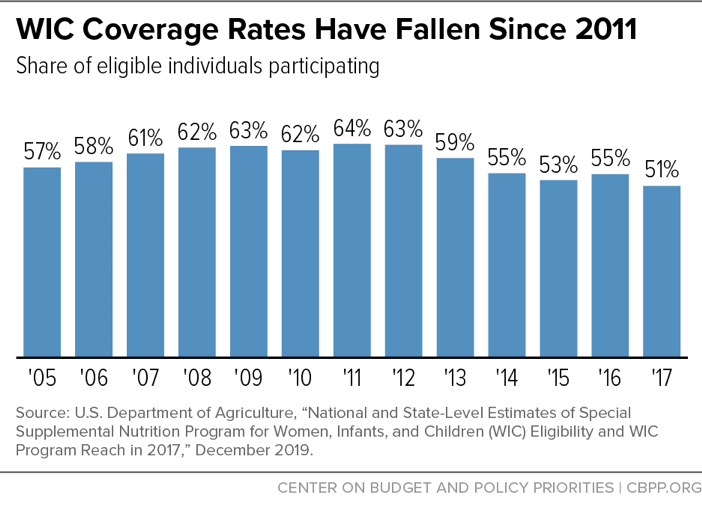BEYOND THE NUMBERS
Participation in the Special Supplemental Nutrition Program for Women, Infants, and Children (WIC), which provides healthy foods, nutrition education, breastfeeding support, and health care referrals, has fallen in recent years — despite its cost-effectiveness, bipartisan support, and link to diet, health, and cognitive benefits. Fortunately, a new bill from Senator Sherrod Brown would support states’ efforts to enroll more low-income families in WIC, especially those that already participate in Medicaid or SNAP (food stamps).
The share of eligible people enrolled in WIC fell from a peak of 64 percent in 2011 to 51 percent in 2017, new U.S. Department of Agriculture (USDA) data show. That’s the lowest share since USDA began measuring WIC’s coverage in 2005. (See chart.)
Meanwhile, the evidence of WIC’s benefits continues to mount. WIC participation is associated with a lower risk of preterm birth and infant mortality, and lower rates of childhood obesity, recent studies have found. Given such important benefits, ensuring that low-income families with young children participate in WIC should be a priority for federal and state policymakers.
They could start with families that are already receiving Medicaid or SNAP, which make them automatically income-eligible for WIC. (Medicaid and SNAP have their own positive impacts on health and development.)
By participating in Medicaid and SNAP, these families have sought help to meet their nutrition and health needs, which WIC does effectively. Yet states that conduct data matches find that many families enrolled in Medicaid or SNAP do not participate in WIC. In Montana, for example, 48 percent of children under 5 who participate in SNAP don’t participate in WIC. In Virginia, the figure is 54 percent.
But only a handful of states even conduct such matches, so we don’t know how many families who are enrolled in Medicaid or SNAP are missing out on WIC. Senator Brown’s bill would fill this knowledge gap by directing USDA to publish an annual state-by-state measure of how many pregnant women and children under 5 participate in Medicaid or SNAP as well as WIC.
The bill would also create a structure to help states reach more families that are missing out. It would require the state agencies that run WIC, Medicaid, and SNAP to develop a joint cross-enrollment plan and policies to routinely refer SNAP and Medicaid recipients to WIC. And it would give states funding for grants and technical assistance to help implement their plans and work toward their cross-enrollment goals.
When Congress considers comprehensive legislation to reauthorize WIC, it can help ensure that low-income families with young children get the full complement of major public benefits, including WIC, that support healthy development and learning by including Senator Brown’s bill.

